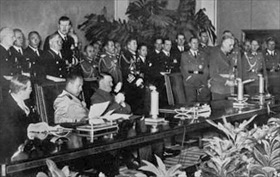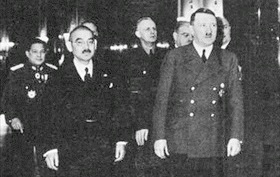JAPAN INVITES U.S. TO JOIN AXIS PACT
Tokyo, Japan • October 13, 1940
On this date in 1940 Japan’s foreign minister Yōsuke Matsuoka, who had grown up in Oregon and California (1893–1902), invited the United States and other nonaligned nations to join the Tripartite Pact, which Axis powers Nazi Germany, Fascist Italy, and Imperial Japan had initialed in Berlin the previous month (September 27). The Pact was an outgrowth of the “Rome-Berlin Axis” celebrated by the Italo-German “Pact of Steel,” which Adolf Hitler’s foreign minister Joachim von Ribbentrop and Benito Mussolini’s foreign minister (and son-in-law) Count Galeazzo Ciano had signed in Berlin in late May 1939.
The “new world order” envisioned by Tripartite founding members, said Matsuoka, was one in which economic barriers would be broken down and the natural geographic divisions of the world established in complementary fashion to bring prosperity to all peoples. Leading the nations into the new nirvana were the signatories themselves: Article 1 of the Tripartite Pact stipulated that Japan “recognizes and respects the leadership of Germany and Italy in the establishment of a new order in Europe.” Article 2 stipulated that Germany and Italy “recognize and respect the leadership of Japan in the establishment of a new order in Greater East Asia,” which the Japanese called the Greater East Asia Co-Prosperity Sphere. (The Greater East Asia Co-Prosperity Sphere was a military-economic association consisting of the Japanese Empire and various national organizations throughout East Asia and the East Indies.) Ten days after Foreign Minister Matsuoka had floated his invitation to the U.S. and other nonaligned nations, the leader of the Pact, Hitler himself, on a whirlwind tour of vanquished-foe France, appealed in person to Spanish dictator Francisco Franco and Vichy president Marshal Philippe Pétain to join the 3 signatories. Neither did.
A seldom-noted footnote to the above 3-part pact was Hitler’s offer to open “pact-hood” to Germany’s historical nemesis, the Soviet Union. When Hitler and Ribbentrop sat down with Soviet Foreign Minister Vyacheslav Molotov in Berlin during the latter’s visit on November 12–14, 1940, the German duo presented Molotov with revisions to the original September 17, 1940, treaty that would now include the Soviet Union as an equal partner. Because the treaty established each signatory’s “natural spheres of influence” in the world, Hitler was keen on deflecting Soviet dictator Joseph Stalin’s interest away from Finland, Romania, Bulgaria, and the Balkans to Iran and Iraq, where the British pressed a claim of hegemony. Stalin’s heavily conditional reply on November 25 was interpreted by the German dictator as dead on arrival.
Starting in late November 1940 the Tripartite Pact swiftly expanded: Hungary, to which Hitler had generously given half of Romania’s Transylvania in late August, signed up on November 20; Romania, threatened by Stalin’s Soviet Union on its northeastern border, joined on the 23rd; and the Slovak Republic, formed from a portion of dismembered Czechoslovakia, came aboard the next day. By the time Bulgaria, recipient of Romania’s southern Dobruja, joined the Tripartite Pact in March 1941, the entire Balkans and Eastern Europe were either in treaty relationship with the Axis powers or, like Yugoslavia was soon to be, under Axis occupation. Urged on by Japan, Japanese-occupied Thailand and the Chinese puppet state of Manchukuo (Manchuria) and the Japanese collaborationist “Republic of China” (led by Chinese Nationalist foe Wang Jingwei) became unofficial signatories of the Tripartite Pact on February 15, 1942.
Germany and Japan During Axis Heyday, 1940–1941
 |  |
Left: September 27, 1940, the Axis Powers (Germany and Italy) grew by one when Japan’s ambassador Saburō Kurusu (left in picture), Italy’s foreign minister Galeazzo Ciano (to Kurusu’s left), and Germany’s foreign minister Joachim von Ribbentrop (standing at podium at right) signed the 3‑way Tripartite Pact. Adolf Hitler (slumping in chair) witnessed the gala proceedings. Despite signing a 10‑year military and commercial convention in 1940, Germany, Italy, and Japan for the most part fought separately during World War II and surrendered separately less than 5 years into the pact: Italy in September 1943, Germany in May 1945, and Japan in September 1945. Americans remember Kurusu as 1 of 2 Japanese envoys who tried to negotiate peace and understanding with the Roosevelt administration in November and December 1941 while their country was secretly preparing the attack on U.S. military installations at Pearl Harbor, Hawaii.
![]()
Right: En route to Moscow where he signed the 5‑year Soviet-Japanese Neutrality (or Nonaggression) Pact in April 1941, foreign minister Yōsuke Matsuoka paid a visit to his country’s Axis partner in Berlin in March. In the background between Matsuoka and Hitler is German foreign minister Ribbentrop. Matsuoka, who in 1933 led Japan’s walkout of the League of Nations, was a major advocate of Japan’s alliance with Germany and Italy, whose assistance he saw as a perfect balancing force against U.S. and British interests in the Asia Pacific region. (In his March 1941 discussions with his German counterpart, Matsuoka reassured Ribbentrop that Japan was making preparations to occupy the British stronghold of Singapore on the Malay Peninsula in response to Ribbentrop’s urging Japan to do just that.) Following Japan’s defeat in Asia and the Pacific by the Allies in 1945, Matsuoka was arrested on the orders of Supreme Commander of the Allied Powers, Gen. Douglas MacArthur, and held at Sugamo Prison (near Tokyo), where he died in 1946 prior to his trial on war crimes charges before the International Military Tribunal for the Far East (Tokyo Trials).
Japan Joins Germany and Italy in Tripartite Pact, September 27, 1940 (Skip first 20 seconds)
![]()

 History buffs, there is good news! The Daily Chronicles of World War II is now available as an ebook for $4.99 on Amazon.com. Containing a year’s worth of dated entries from this website, the ebook brings the story of this tumultuous era to life in a compelling, authoritative, and succinct manner. Featuring inventive navigation aids, the ebook enables readers to instantly move forward or backward by month and date to different dated entries. Simple and elegant! Click
History buffs, there is good news! The Daily Chronicles of World War II is now available as an ebook for $4.99 on Amazon.com. Containing a year’s worth of dated entries from this website, the ebook brings the story of this tumultuous era to life in a compelling, authoritative, and succinct manner. Featuring inventive navigation aids, the ebook enables readers to instantly move forward or backward by month and date to different dated entries. Simple and elegant! Click 











